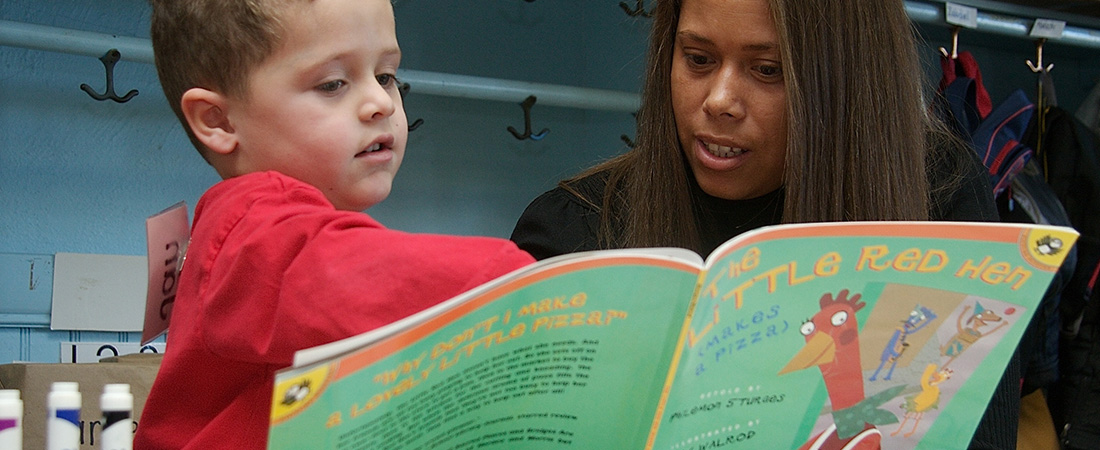Setting Young Children Up for Success

Many young children face serious mental health challenges:
- Approximately 9 to 14 percent of all children from birth to age 5 experience emotional and behavioral disturbances that negatively affect their functioning and development.1
- More than 5,000 public preschoolers were suspended at least once during the 2011–2012 school year.2
Sources:
1. Brauner, C. B., & Stephens, B. C. (2006). Estimating the prevalence of early childhood serious emotional/behavioral disorder: Challenges and recommendations. U.S. Public Health Service. Public Health Reports 121, 303–310. Retrieved from http://www.ncbi.nlm.nih.gov/pmc/
articles/PMC1525276/
2. U.S. Department of Education Office for Civil Rights. (2014, March). Civil rights collection data. Data Snapshot: Early Childhood Education (Issue Brief No. 2). Retrieved from http://www2.ed.gov/about/offices/
list/ocr/docs/crdc-early-learning-snapshot.pdf
Without early intervention, behavioral problems in young children can lead to a variety of issues in adolescence, including difficulty learning, juvenile delinquency, and dropping out of school. A startling number of young children suffer from mental and emotional issues, with an estimated one in five children expelled from preschool as a result.
EDC was recently chosen by the Substance Abuse and Mental Health Services Administration (SAMHSA) to direct the new Center of Excellence for Infant and Early Childhood Mental Health Consultation. EDC’s Mary Mackrain and Kim Netter discuss the importance of the work that mental health consultants do to reach children with behavioral issues before problems escalate.
Q. Why are so many young children exhibiting behavioral issues?
 Netter: A lot can happen in a child’s life before they ever enter preschool, where many behavioral issues are first noticed by care providers. Children can absorb whatever stressors are happening in their households, their neighborhoods, and their communities. Research suggests that an early onset of mental health issues is linked to environmental factors, such as poverty, exposure to violence, and physical or emotional neglect. However, prevention work can be done and supports can be put in place early on when a mental health consultant is in the mix promoting healthy development and growth, so children can thrive in school and in life.
Netter: A lot can happen in a child’s life before they ever enter preschool, where many behavioral issues are first noticed by care providers. Children can absorb whatever stressors are happening in their households, their neighborhoods, and their communities. Research suggests that an early onset of mental health issues is linked to environmental factors, such as poverty, exposure to violence, and physical or emotional neglect. However, prevention work can be done and supports can be put in place early on when a mental health consultant is in the mix promoting healthy development and growth, so children can thrive in school and in life.
Q. How do mental health consultants help prevent these issues from escalating?
 Mackrain: Early childhood mental health consultation teams mental health professionals with early childhood professionals to improve the social, emotional, and behavioral health of children in child care and early education programs. The mental health consultant offers skilled observations, individualized strategies, and early identification of children with challenging behaviors that places them at risk for expulsion. The key is that services must be provided by mental health experts who have worked with children under age five.
Mackrain: Early childhood mental health consultation teams mental health professionals with early childhood professionals to improve the social, emotional, and behavioral health of children in child care and early education programs. The mental health consultant offers skilled observations, individualized strategies, and early identification of children with challenging behaviors that places them at risk for expulsion. The key is that services must be provided by mental health experts who have worked with children under age five.
For example, let’s say a child care program director is struggling with toddlers biting. The mental health consultant would help the director and staff develop a policy outlining steps for supporting all children, including those who bite. They would also help the director meet with parents and address their concerns and fears. Children’s well-being is improved and mental health problems are prevented as a result of the consultant’s work with teachers, program directors, and parents. This has lifelong implications for the child.
Q. What are some of the biggest challenges in the growing field of childhood mental health consultation?
Netter: Number one is promoting a better understanding of early childhood mental health consultation—that it is an important, efficient, and effective way to support child development and school readiness. Number two is reducing the stigma around mental health and children. And number three is training people in this area, those who can provide mental health consultation and those who can request mental health consultation.
Mackrain: A mental health consultant needs to understand a lot of complex issues. It’s not just going in and helping kids to stop fighting or acting out. It’s much more complicated than that. Mental health consultants provide services to programs, schools, and families—often all at once. We need to train a robust workforce that can work across these environments to prevent behavioral problems in children before they require treatment. We also need support services to help these professionals deal with the trauma they see in their work and to prevent burnout.
Q. How will the new center help address childhood mental health needs?
Netter: Our goal is to galvanize the mental health consultation community, state child agencies, and the home visiting community to make sure that the very youngest children’s mental health is not ignored, and that this profession is recognized as critical to giving young kids a good start to school and life. EDC has the research and tools in place from our previous work to move this agenda forward.
Mackrain: We are working with federal partners, private funders, and national leaders to develop resources and strategies that affect not only workforce strengths but the policy, funding, systems development, and messaging needed to improve this service for all children and families. We hope to build bridges for all families to get the services they need so their children can succeed.